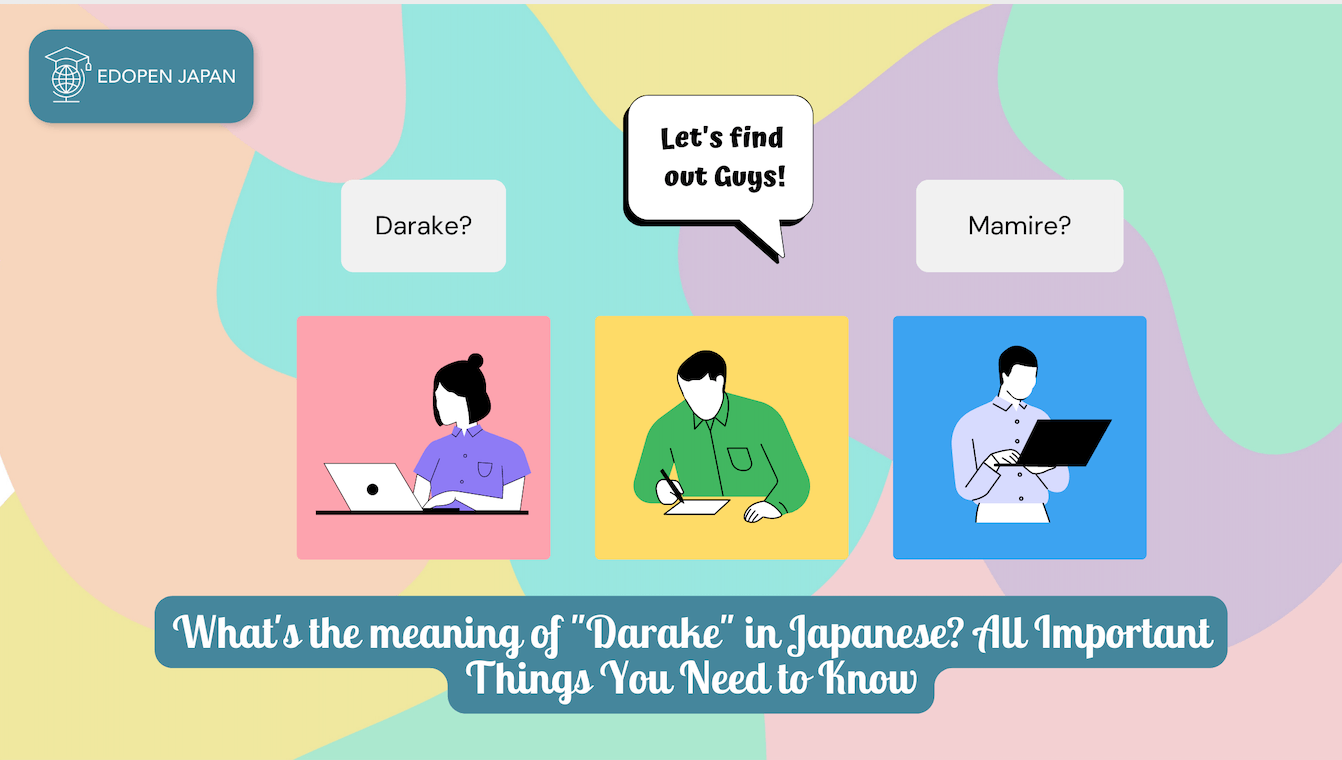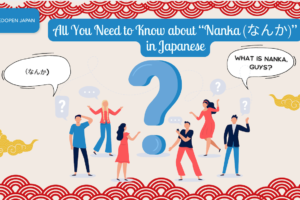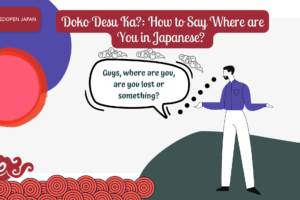Have you ever heard of the word “darake” in Japanese? Sometimes Japanese people use phrases like “Gomi-Darake [ごみだらけ], which means [Full of trash]”, “Kizu-Darake [傷だらけ], which means [Full of scratches]”. It is a very useful phrase to express “full of something”.
Although this is above the N3 level and may be difficult. However, it is very good for you to learn this phrase to make your conversation in Japanese more interactive.
If you have a look at this article, you would understand “Darake” and another word with similar meaning called “Mamire”. In addition, if you are interested in learning Japanese, please also take a look at some articles I wrote here. But first, let’s have a look at “Darake” here! I hope you enjoy this article!
In addition, if you are currently studying Japanese and want to learn phrases that are often used in everyday Japanese conversation, please read our recommendations below:
Read also:
Everything You Need to Know about “Daijoubu (だいじょうぶ)”
All You Need to Know about “Nanka (なんか)” in Japanese
The Meaning of Yabai (やばい): All You Need to Know
Contents
What does “Darake” mean in Japanese?
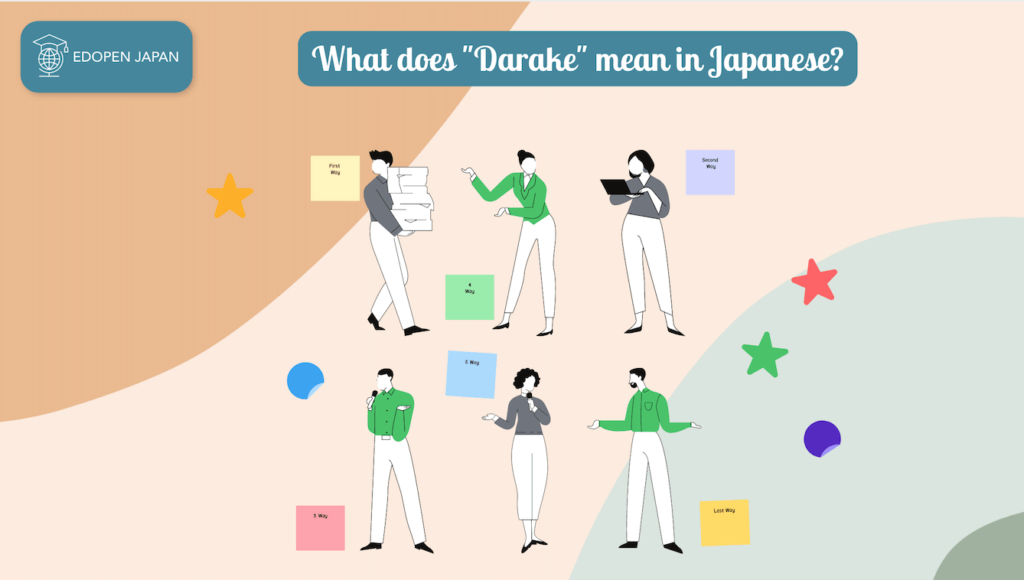
“Darake” is usually used when something is riddled everywhere, and means “full of” and “covered with. It generally has a negative connotation. As a result, you’ll often see “darake” used with expressions such as “machigai darake,” “gomi darake,” or “hokori darake.
There are no conjugation rules to cover here, all you need to do is attach “Darake” to the noun, which is everywhere. You should treat the result as you would a regular noun. Use “Darake” to describe the state of being all over something. Attach “Darake” to the noun that is covering the object or place.
| Grammar: Noun + Darake Meaning: “Full of..” “Covered with..” “A lot of.. (something undesirable)” |
The word “darake” is used to describe “The number of certain things in the observed area is greater than others, and they clearly exist. Here, “Darake” means “There are other things,” but the number is small and they are not conspicuous, and as far as you can see, the state where a specific thing is conspicuous.
Although there is no specific standard for quantity, the state occupied by the majority who can clearly see that the number and quantity are large at a glance is expressed as “full of”.
How do you use “Darake” in a sentence?

“Darake” is a phrase used to mean “there is a lot of”. Remember that “darake” is not used for good things, but for negative things. “Darake” means “There are many and conspicuous”. It is used almost in a negative sense.
The example of sentences with negative meaning
- テーブルの上うえがゴミだらけだ。
Table-no ue ga “Gomi-Darake” da.
There’s a lot of trash on the table.
The example of sentence with positive meaning
- テーブルの上がおいしい料理だらけだ。
Table no ue ga “Oishii Ryouri-Darake” da.
There’s a lot of delicious food on the table.
| Japanese Sentences | How to read | Meaning in English |
| 先週のテストは間違いだらけだった。 | Senshu no test wa [Machigai-Darake] datta | There are a lot of mistakes in last week test. |
| 彼女の部屋はゴミだらけだ。 | Kanojyo no heya wa [Gomi-Darake] da | Her room is full of garbage. |
| 私のクラスは男だらけだ。 | Watashino kurasu wa [Otoko-Darake] da | My class is full of men. |
| こどもたちがどろだらけで遊んでいる | Kodomo-tachi ga [Doro-Darake] de asondeiru | The children are playing in the mud. |
The Example Sentences
| Japanese Sentences | How to read | Meaning in English |
| 今日のパーティーは知しらない人だらけ だ。 | Kyou no party wa [Shiranaihito-Darake] da. | Today’s party is full of people I don’t know. |
| 床がほこりだらけ になっている。 | Yukaga [Hokori-Darake] ni natteiru. | The floor is covered with dust. |
| 彼の話はうそだらけ だ。 | Kare no hanashi wa [Uso-Darake] da. | His story is full of lies. |
| 息子がころんで、血だらけになった。 | Musuko ga Koronde [Chi-Darake] ni natta. | My son fell on and covered in blood. |
| 転職してしらない事ことだらけ なので勉強しなければならない。 | Tenshokushite [Shiranaikoto-Darake] nanode benkyou shinakerebanaranai | I’ve just started a new job in a new industry and there’s a lot I don’t know, so I need to learn. |
※ Notice
How the “の[No]” particle is used to modify since “Darake” functions as a noun.
For example:
ほこりだらけのテレビをふいてくれない?
“Hokori-Darakeno” TV wo Huitekurenai?
Can you properly dust this TV covered in dust?
| Formation: N + Darake or N + Darakeno + N ※ Connect only to nouns |
Please refer to the table below to understand the most common way the Japanese say this word.
The “Darake” phrases often used by native Japanese speakers
| Japanese | Romaji | Meaning |
| ごみだらけ | Gomi-Darake | Full of Garbages |
| まちがいだらけ | Machigai-Darake | Full of Mistakes |
| 傷だらけ | Kizu-Darake | Full of Scratches |
| しわだらけ | Shiwa-Darake | Full of Crumpled |
| うそだらけ | Uso-Darake | Full of Lies |
| 人だらけ | Hito-Darake | Full of People |
| わからないことだらけ | Wakaranaikoto-Darake | Full of Unknown things |
| 嫌いなものだらけ | Kirainamono-Darake | Full of Dislike things |
The “Mamire”, another similar phrase of the “Darake”
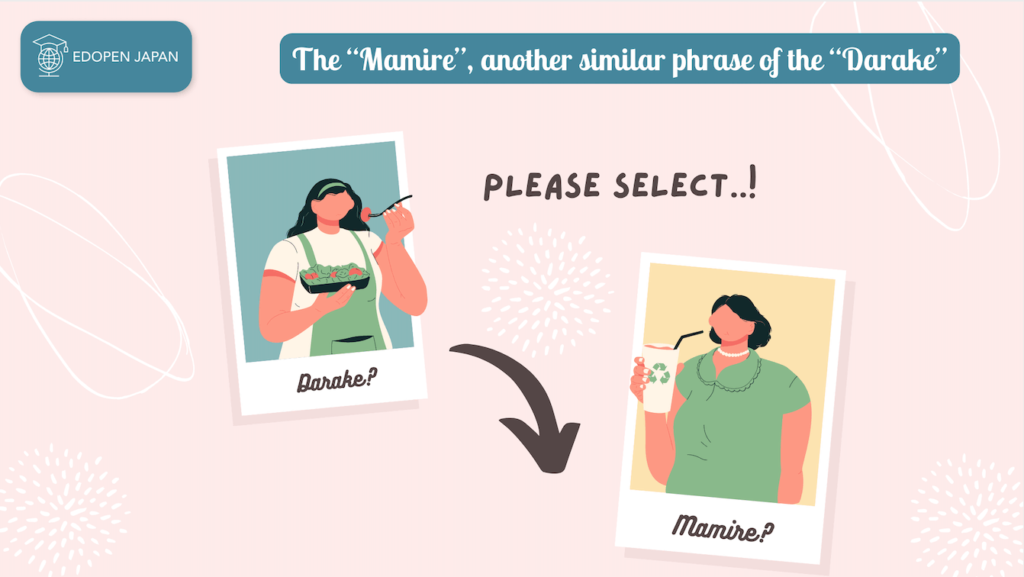
What does “Mamire” mean?
“Mamire may seem very similar to Darake, but there are some important subtle differences. First, it means that there is a lot on the surface. It’s only used for actual physical objects, so you can’t say things like machigai – mamire [mistake] like you can with “darake. Also, you can only use it for things that cover the object.
In other words, you can’t use it to mean “littered” or “riddled” like we did with “Darake”. So you can use it for things like liquids and dust, but you can’t use it for things like scratches and garbage. The grammatical rules are the same as for “Darake”.
| Grammar: Noun+”Mamire or Norn+”Mamireno”+Norn Meaning: There is a lot on the surface |
The “Mamire” phrases oten used by Native Japanese
| Japanese | Romaji | Meaning |
| 血まみれ | Chi-Mamire | Full of Blood |
| どろまみれ | Doro-Mamire | Full of Mud |
| ホコリまみれ | Hokori-Mamire | Full of Dust |
| 油まみれ | Abura-Mamire | Full of Oil |
| 汗まみれ | Ase-Mamire | Full of Sweat |
| 借金まみれ(Exception) | Shakkin-Mamire | Full of Dept |
The “Mamire” Example Sentences
(1) キッチンが油まみれだ。
Kitchen ga Abura-Mamire da.
The kitchen is covered with oil
(2) ホコリまみれの部屋。
Hokori-Mamire no heya.
A room covered with dust.
(3) 血まみれのナイフ。
Chi-Mamire no naihu.
Bloody knife.
The Explanation of “Mamire”
“Mamire is a phrase used to mean “A lot of ~ is attached to the whole surface. This pattern is used for negative things. Remember that “A lot of dirty things are attached to the surface” doesn’t mean “Attached to the surface of the body” like うそ[Lies] and まちがい[Mistakes], so the sentence is a little unnatural.
On the other hand, “Darake” has a broader meaning than “Mamire” and is a word that expresses “a state where there is a lot of something and it is not good.
The “Mamire” sentence example
“Mamire is used to mean “A lot of ~ is attached to the surface,” so unlike “Darake,” it cannot be used for “things that do not stick to the surface.
⭕️ 先週のテストは間違いだらけだった。
Last week’s test was full of mistakes.
❌ 先週のテストは間違いまみれだった。
(“Mistake” does not adhere to the surface)
Get to know the “Machigai-Mamire”
“Mamire means “a liquid or powdery substance that sticks to the surface of the body and becomes dirty. “Ase-Mamire” at the beginning means “sweaty and sticks to the surface of the body and becomes dirty”. Since “sweat” is a liquid, it can be combined with “mamire.
In this way, “mamire” means that liquid or powdery substances stick to the surface of the body and become dirty. “Mamire” is used when you want to say that there is a lot of “~,” but it is more often used when you want to say that having a lot of “~ is an undesirable condition. “Mamire” is written as [塗れ”paint”] when written in Chinese characters.
Looking at the Japanese characters, I think it’s easy to guess the meaning, but there is one exception 😮
The Exceptions!
彼は借金まみれだ。
Kare wa Shakkin-Mamire da.
He’s covered in debt (meaning: he’s got a lot of debt)
This “Shakkin [Debt] -Mamire” “Full of Dept” is often used as an exception. It’s okay to remember that you can only use anything that sticks to the surface other than “Debt”!
What’s the difference between Darake & Mamire?
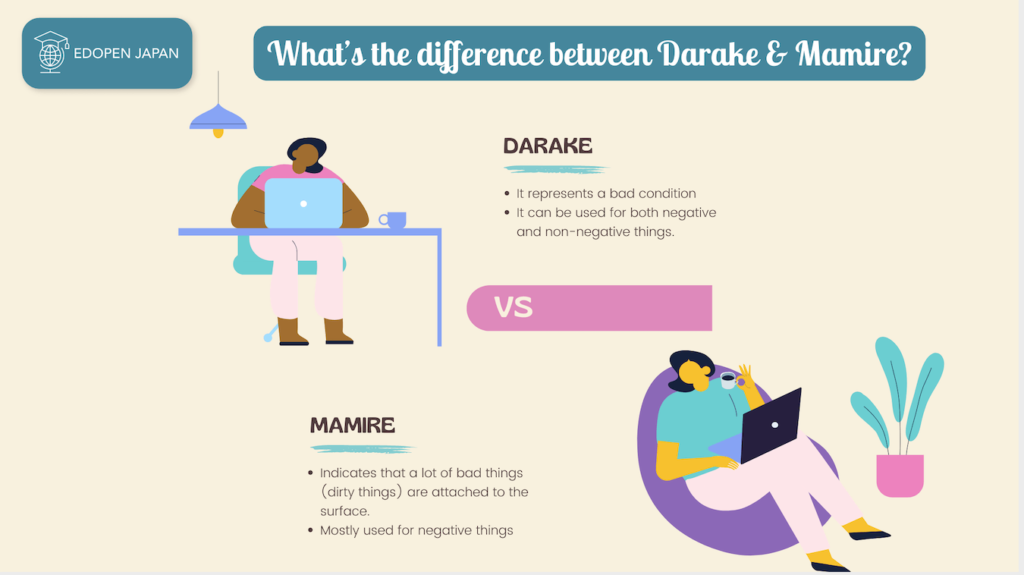
Sometimes you may be confused about the use of “Darake” and “Mamire”. They look the same, but have slightly different meanings and uses. Here you can learn the difference between “Darake” and “Mamire”. The word “Darake” means “to be covered with oneself”. It also means “a lot”.
On the other hand, “mamire” means “a liquid or powdery substance that sticks to the surface of the body and becomes dirty. As you can see, these two words have very similar meanings.
Then, “Darake” has a much broader meaning than “Mamire” and is a word that expresses “a state where there is a lot of something and it is not good.
Therefore, it can indicate that there are a lot of bad things on the surface, such as “Doro-Darake” [Full of Earth] and “Chi-Mamire” [Full of Blood], and such as “Uso-Darake” [Full of Iies] and “Machigai-Darake” [Full of Mistakes]. It can also mean that there are a lot of bad things.
So, Darake means there is a lot of something, and it represents a bad condition. It can be used for both negative and non-negative things, but it has a strong negative impression. Then, Mamire means that a lot of bad things (dirty things) are attached to the surface. Mostly used for negative things, in a sentence that can be paraphrased as “Darake”, the speaker’s negative feelings are more than “Darake”.
※ Notice
“Mamire” has a negative image, but “Darake” shows many situations, but it can be used even if it is not negative. In addition, “Mamire” has the restriction of “the surface of the body” and the restriction of “liquid and powdery”.
On the other hand, “Kuruma-Darake” refers to roads with heavy traffic and is called “Full of Cars”.
For example:
猫だらけの島。
“Neko-Darake”no Shima.
An island full of cats
野菜だらけ弁当。
”Yasai-Darake”bento.
A bento full of Vegetables
How to Use Darake & Mamire Properly?

| Object | Full of ~ | |
| ごみ [Gomi] Garbage | 〇 Darake | △ Mamie |
| しょるい [Shorui] Docuent | 〇 Darake | 〇 Mamire |
| ほこり [Hokori] Dust | 〇 Darake | 〇 Mamire |
| Human | ||
| 男 [Otoko] Man | 〇 Darake | × Mamire |
| 人 [Hito] Human | 〇 Darake | × Mamire |
| Liquid | ||
| なみだ [Namida] Tears | 〇 Darake | ◎ Mamire |
| 油 [Abura] Oil | △ Darake | ◎ Mamire |
| Abstract Object | ||
| 借金 [Shakkin] Dept | 〇 Darake | ◎ Mamire |
| Colour | ||
| 黒 [Kuro] Black | × Darake | × Mamire |
Since “mamire” is used for small objects, “hokori-darake” [full of dust] has a large amount of dust, and “hokori-mamire” has a small amount of dust. Since garbage has a certain amount of mass, “Mamire” is △ and “Darake” is 〇.
The Summary of Noun
| Japanese | Darake or Mamire | Meaning |
| 血 [Chi] | だらけ/まみれ | Full of Blood |
| どろ [Doro] | だらけ/まみれ | Full of Mud |
| ほこり [Hokori] | だらけ/まみれ | Full of Dust |
| 砂 [Suna] | だらけ/まみれ | Full of Sand |
| 借金 [Shakkin] | だらけ/まみれ | Full of Dept |
If we talk about the situation of these five nouns, “Darake”and “Mamire” are almost the same meaning.
Summary
- “Darake means “full of” and “there is a lot of”. It is always associated with a noun.
- “Darake” and “Mamire” is almost same meaning, but “Mamire” is limited use for liquid and “Darake” is much wider use than “Mamire”.
- “Darake” is often used in a negative sense, but sometimes in a non-negative sense, but “Mamire” is only used in a negative sense.
- It is better to learn basic “darake” and “mamire” phrases to have more interactive communication in Japanese.

